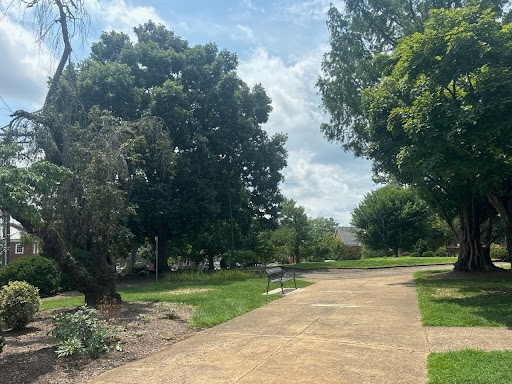The Charlottesville Department of Parks & Recreation is currently gathering community feedback and input as it develops a master plan for the future of the city’s public spaces. As part of the master plan—which will guide the department for at least the next 10 years—the city is examining current and emerging community needs through a closer look at four parks: Court Square Park, Market Street Park, Tonsler Park, and Washington Park.
Since last November, the city has been collecting public comment through consultant groups Kimley-Horn and PROS Consulting. Online engagement with the project has been promising, with 973 surveys completed on the project website and 545 comments made through the interactive map feature as of July 29.
Each park-specific survey asks respondents to share how often they visit the park and their thoughts on the park’s cleanliness, safety, and potential amenities. Specific features mentioned in the form include food carts, art exhibits, vendors, public art, historic markers and displays, public games, water features, and native plants. There is also a space for more in-depth comment on both the surveys and the map feature.
According to Will Bassett, Parks & Rec business manager and one of the project managers for the master plan, the most filled-out park-specific survey so far is for Booker T. Washington Park, with 121 submissions.
While the city and consultants anticipated significant public engagement at city council’s input session on Market Street Park and Court Square Park on July 15, extremely low turnout prompted a second event to be held at CitySpace on July 29. The parks are the former sites of the Robert E. Lee and Thomas “Stonewall” Jackson statues, respectively, and gathered national attention during A12. Both sites were originally segregated.
Andrea Douglas, executive director of the Jefferson School African American Heritage Center, was the only participant in the city council session who commented on the parks, updating council on the Swords Into Plowshares project. (Another woman mistakenly attended believing the comment session was for Parks & Rec more broadly, asking for shades for the pickleball courts at Carver and Keys recreation centers.)
Despite the lack of public participation at the council meeting, councilors gave their thoughts on the parks and the broader master plan.
“Two paths for these two parks [Market Street Park and Court Square Park]: One is these could be parks that are pretty standard and could be [parks] that [exist] in most any city in the country. Or two, they could be defining public spaces that engage thoughtfully with local history,” said Councilor Michael Payne.
“Both of these parks have a lot of pain associated with them,” said Vice Mayor Brian Pinkston. “How we honor that history and how we honor the events of a few years ago and do so in a way that’s honest and authentic to who Charlottesville is—particularly since there will be a lot of other people who want to write narratives about what happened in those parks—I think it’s going to be really important.”
The meeting about Market Street Park and Court Square Park on July 29 garnered more participants than that on July 15, but attendance of the in-person input session was still sparse. Six constituents were in attendance, with one member of the Parks & Rec advisory board also speaking in his capacity as a city resident.
Attendees largely agreed that the master plan should aim to bring people together in the parks, though there were some differing opinions on what design choices best facilitate gatherings. Topics of discussion included the history of the parks, safety improvements, tree cover, accessibility, and potential community engagement.
Frank Bechter, a local musician, floated the idea of Market Street Park as a living monument, focusing on the potential community engagement brought through plantings and rotating events. “Various kinds of plants, flowers—all kinds of people are interested in that and are gardeners,” he said. “There could be community engagement between the city and interested lovers of green.”
Alex Joyner, pastor at Charlottesville First United Methodist, spoke about acknowledging the parks’ histories and driving engagement in the spaces. “I think some kind of historical recognition is probably good,” he said. “I’d just like to see events that bring the community together happen in that space.”
“I’m going to take issue with ‘that park has a lot of history,’” said Genevieve Keller, a current member of Charlottesville’s Historic Resource Committee. “I’d say that park only has a recent history. The most significant thing that ever happened at that park happened in 2017 and before that, it was a very passive park … I mean, [the Lee statue] was there, people knew, and people reacted to it in their own ways. … It really was a successful event space.”
“I’m sure there were people who did not feel welcome there for a variety of reasons, but it really did serve as that kind of informal community gathering place,” said Keller.
Public surveys for the Parks & Rec master plan are open until August 25. For more information about the project or to participate in the survey, visit charlottesville.gov/1742/Parks-Recreation.
